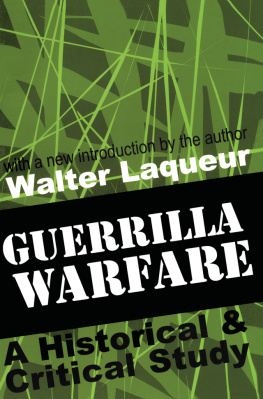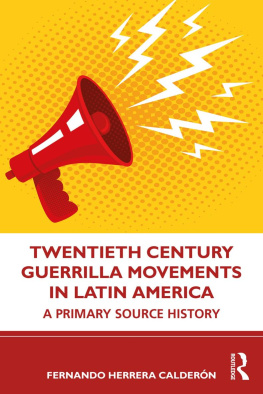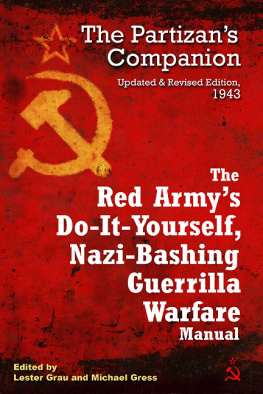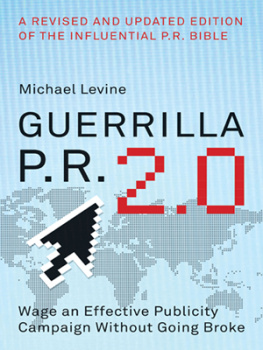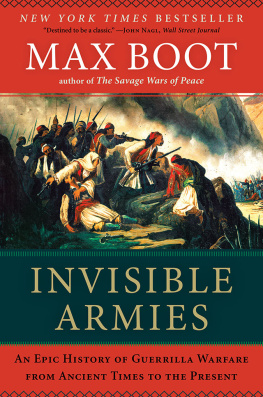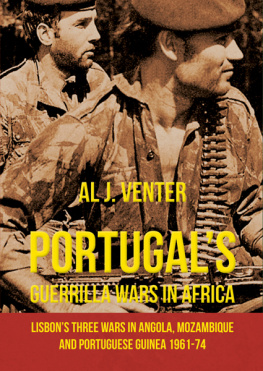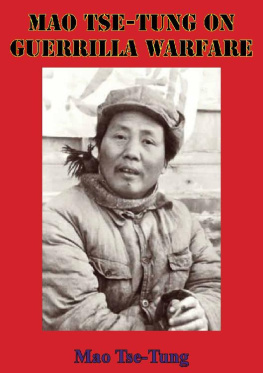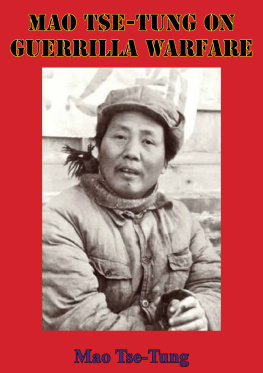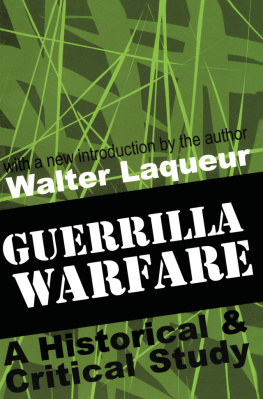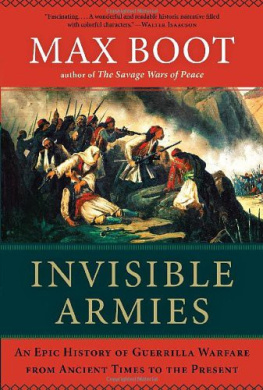Laqueur - Guerrilla warfare: a historical & critical study
Here you can read online Laqueur - Guerrilla warfare: a historical & critical study full text of the book (entire story) in english for free. Download pdf and epub, get meaning, cover and reviews about this ebook. City: Abingdon;Oxon;New York;NY, year: 2017, publisher: Taylor and Francis;Routledge, genre: History. Description of the work, (preface) as well as reviews are available. Best literature library LitArk.com created for fans of good reading and offers a wide selection of genres:
Romance novel
Science fiction
Adventure
Detective
Science
History
Home and family
Prose
Art
Politics
Computer
Non-fiction
Religion
Business
Children
Humor
Choose a favorite category and find really read worthwhile books. Enjoy immersion in the world of imagination, feel the emotions of the characters or learn something new for yourself, make an fascinating discovery.
Guerrilla warfare: a historical & critical study: summary, description and annotation
We offer to read an annotation, description, summary or preface (depends on what the author of the book "Guerrilla warfare: a historical & critical study" wrote himself). If you haven't found the necessary information about the book — write in the comments, we will try to find it.
Laqueur: author's other books
Who wrote Guerrilla warfare: a historical & critical study? Find out the surname, the name of the author of the book and a list of all author's works by series.
Guerrilla warfare: a historical & critical study — read online for free the complete book (whole text) full work
Below is the text of the book, divided by pages. System saving the place of the last page read, allows you to conveniently read the book "Guerrilla warfare: a historical & critical study" online for free, without having to search again every time where you left off. Put a bookmark, and you can go to the page where you finished reading at any time.
Font size:
Interval:
Bookmark:

GUERRILLA WARFARE
with a new introduction by the author
Walter Laqueur
A Historical & Critical Study

Originally published in 1976 by Little, Brown and Company
Published 1998 by Transaction Publishers
Published 2017 by Routledge
2 Park Square, Milton Park, Abingdon, Oxon OX14 4RN
711 Third Avenue, New York, NY 10017, USA
Routledge is an imprint of the Taylor & Francis Group, an informa business
Copyright 1998 by Taylor & Francis.
All rights reserved. No part of this book may be reprinted or reproduced or utilised in any form or by any electronic, mechanical, or other means, now known or hereafter invented, including photocopying and recording, or in any information storage or retrieval system, without permission in writing from the publishers.
Notice:
Product or corporate names may be trademarks or registered trademarks, and are used only for identification and explanation without intent to infringe.
Library of Congress Catalog Number: 97-29417
Library of Congress Cataloging-in-Publication Data
Laqueur, Walter, 1921
Guerrilla warfare : a historical and critical study / Walter Laqueur, with a new introduction by the author.
p. cm.
Originally published: Boston : Little, Brown, 1976.
Includes bibliographical references and index.
ISBN 978-0-7658-0406-8 (pbk. : alk. paper)
1. Guerrilla warfareHistory. I. Title.
U240.L37 1997
355.02'18dc21
97-29417
CIP
ISBN-13: 978-0-7658-0406-8 (pbk)
These problems (of guerrilla warfare) are of very long standing, yet manifestly far from understood especially in those countries where everything that can be called "guerrilla warfare" has become a new military fashion or craze.
.. LIDDELL HART, Preface to the second edition of Strategy, 1967
Every book has its history and Guerrilla Warfare is no exception. Together with its sequel Terrorism and two companion volumes ( The Guerrilla Reader and The Terrorism Reader) it was part of a wider study such as had not been attempted beforeto give a critical interpretation of guerrilla and terrorism theory and practice throughout history. It did not want to provide a general theory of political violence nor did it give instructions on how to conduct guerrilla warfare or terrorist operations. It was read in various countries and established itself as a text. I hope it contributed to the clarification of certain issues not widely understood at the time among the public at large. The book certainly failed to bring about greater semantic clarity; there had been a widespread tendency in the media and our public discourse to equate great war with small war, guerrilla, terrorism, civil war, and banditry (social and asocial), and this has not changed since this book first appeared in 1976. On the contrary, unsuspecting readers consulting major public libraries for guidance on the subject of guerrilla warfare will find under this heading books on the theater, on business practices (especially sales strategies), on education, and on many other fields of human endeavor. The term guerrilla has become very popular; but in the same measure as the application has multiplied, the meaning has become even more diluted. In addition there has been the widespread use of the unfortunate and misleading term "urban guerrilla" as a euphemism for terrorism. Guerrilla has a positive connotation, by and large, whereas terrorism has not, hence the misapplication.
While the word guerrilla has been very popular, much less attention has been given to guerrilla warfare than to terrorism even though the former has been politically more successful: Most terrorist groups have failed; many guerrilla movements have succeeded. The reasons for the lack of attention are obvious: Guerrilla operations, in contrast to terrorist, take place far from big cities, in the countryside, in remote mountainous regions, or in jungles. In these remote areas there are no film cameras or recorders. This fact has been recognized early on by some guerrilla leaders who decided, unwisely in some cases, to transfer their activities to the big cities. As an Algerian militant put it, if his fighters killed thirty soldiers in a village, this would be reported in a few lines on the back page of the world press, whereas the noise of even a small bomb in a big city would reverberate throughout the world and make headlines.
Has there been more or less guerrilla warfare during the last two decades? The days of the classic, major guerrilla wars seem to be over, no new Mao or Ho Chi Minh, no Tito and no Castro have appeared in our age. The gradual liberation of territories, the establishment of counter institutions and the transformation of guerrilla bands into regular army units has been rare in our time. The war in Afghanistan is probably the only major exception; the list will also include Chechnya (1994-95), but one cannot think of many others. On the other hand, there is a long list of guerrilla wars which have not led to victory: This includes the Kurds in Turkey, the Karen in Myanmar, the rebels in Tajikistan and Southern Sudan, the Tamil in Sri Lanka, the EZLN (the neo-Zapatistas) in Mexico, Sendero Luminoso in Peru, Hizbollah in Lebanon, the various guerrilla groups in the Horn of Africa, various small Punjabi and Kashmiri groups, to mention a few. Some insurgents have used both guerrilla and terrorist strategies; this is true, for instance, with regard to Algeria. In other cases, regular armies have not been strong or well equipped and for this reason were compelled to apply, on occasion, guerrilla tactics as in the former Yugoslavia. The same is true with regard to civil wars as in Rwanda and Zaire. In fact, "pure" guerrilla warfare has become fairly rare. If Mao or Tito were to reappear they would probably not approve of the actions of their descendants, but it is not clear what advice they would offer to cope with conditions quite different from those in which they operated at the time; there is no big war in progress which provided welcome cover for the guerrillas sixty years ago.
A review of strategies and the fate of guerrilla movements during the last two decades shows certain common features. In their great majority they consisted of nationalists fighting for independence whether against foreign occupants or against another ethnic group in their own country. Communism or Maoism did not play a key role as in the 1940s; true, Sendero Luminoso and the Mexican EZLN are social movements, but at the same time they are ethnic rebellions of Indians against the white upper and middle classes. The only exception is the Colombian FARC which at one time gave up armed struggle, but following its electoral defeat in 1992 it resumed it. However, the Colombians became involved with some of the drug cartels to improve their financial condition and while this might be justified from their point of view by pragmatic reasons it has nothing to do with the Marxist-Maoist tradition. Virtually all other conflicts are ethnic in essence except those carried out by Islamic fundamentalists (such as in Algeria) or against fundamentalist regimes (as in Sudan).
Only in two major cases have guerrillas been successful, in Afghanistan and in Chechnya. Victory was achieved because the rebels faced an enemy which had the power to smash the guerrilla but not the political will. These two guerrilla wars happened to coincide with the collapse of the Soviet empire; the Soviet Union had, of course, the power to destroy its enemies but the war was as unpopular as the Vietnam War was in the United States, nor was the regular army prepared for a guerrilla war. Topographical conditions in Afghanistan favored a guerrilla war and in addition there was a tradition of such a war in this country. The war had lasted for years until it was ended by an armistice which provided for the evacuation of all Soviet troops in 1989. However, there was no common front of Afghan resistance fighters which could have effected a smooth political transition. In these circumstances, facing a population tired by war and antagonized by the ambitions of rival war lords, the fundamentalist Taliban, with massive help from Pakistan, occupied Kabul (in October 1996) and large parts of the country.
Font size:
Interval:
Bookmark:
Similar books «Guerrilla warfare: a historical & critical study»
Look at similar books to Guerrilla warfare: a historical & critical study. We have selected literature similar in name and meaning in the hope of providing readers with more options to find new, interesting, not yet read works.
Discussion, reviews of the book Guerrilla warfare: a historical & critical study and just readers' own opinions. Leave your comments, write what you think about the work, its meaning or the main characters. Specify what exactly you liked and what you didn't like, and why you think so.

